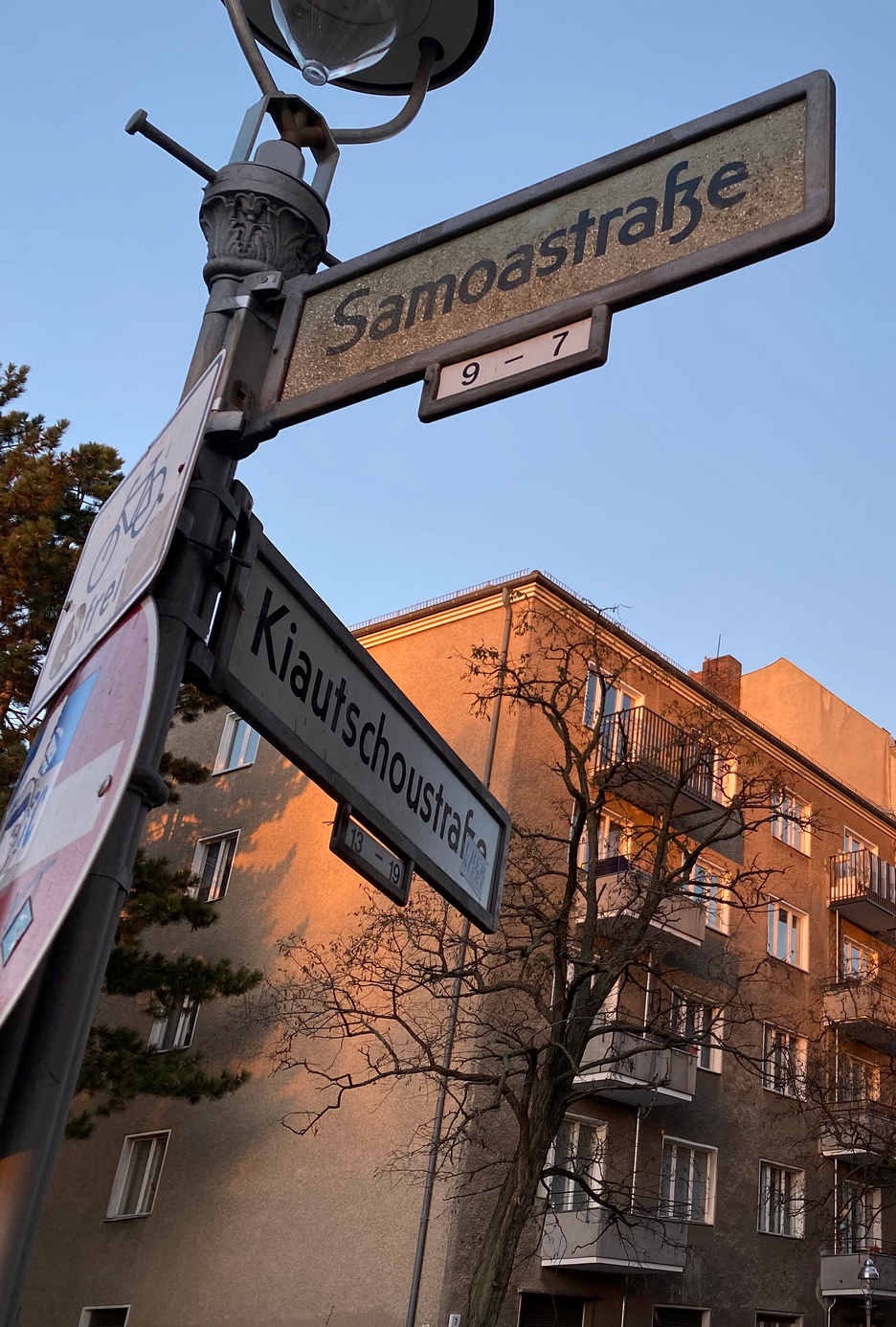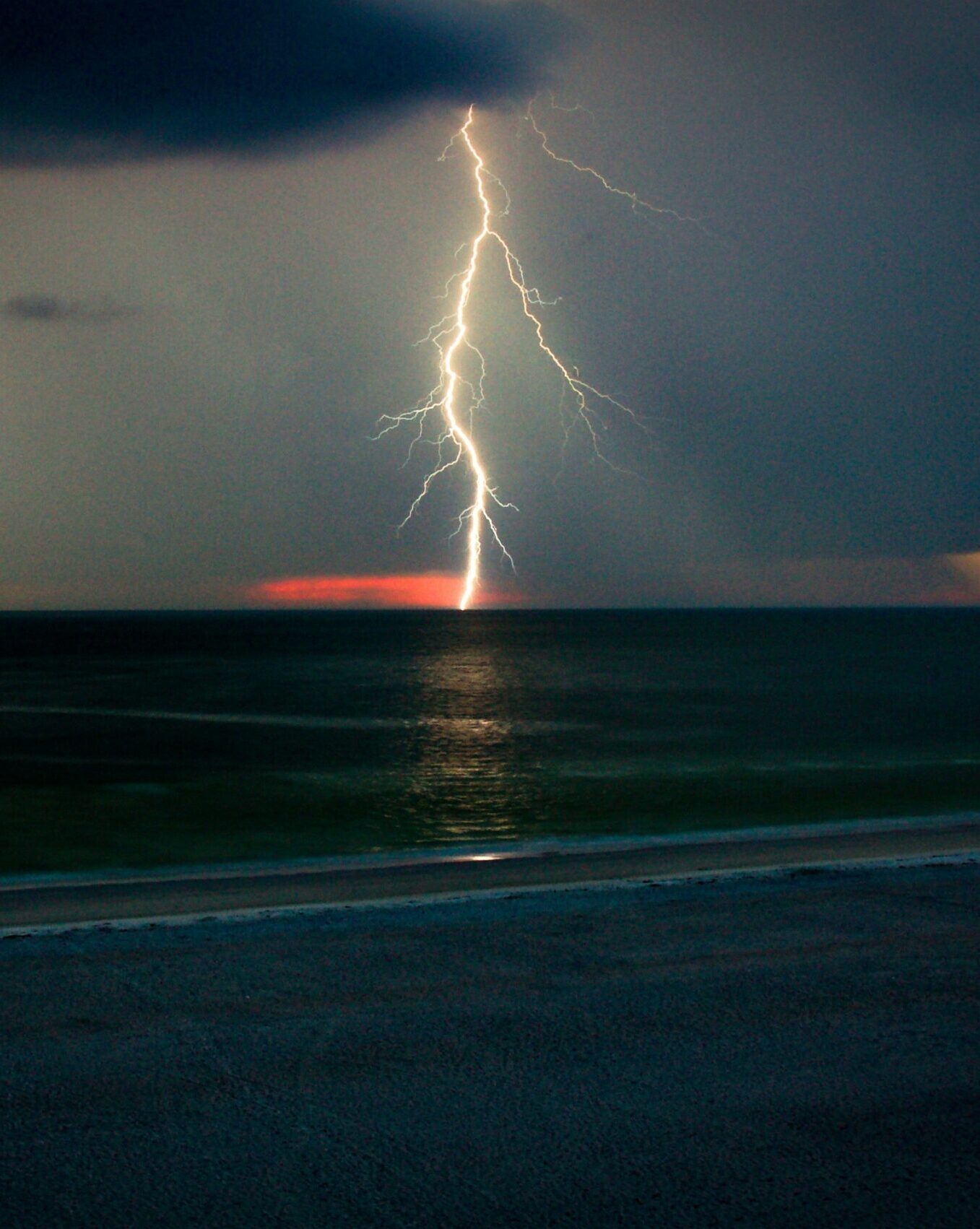By BEINA XU
 Berlin, Germany
Berlin, Germany
I live in the wrong colonial quarter of Berlin.
My neighborhood is called Afrikanisches Viertel, and my flat is on Guinea Street. There’s Kongostraße, Togostraße, Kamerunerstraße, Transvaalstraße, Sansibarstraße, Otawistraße—I could go on, but you could also just Google Germany’s colonial conquest of Africa.
I say I’m living in the wrong quarter because the street named after Germany’s former colony in China is a 5-minute bike ride south. Kiautschoustraße is a zippy 350 meters from east to west, bookended by a miniscule park called Pekingerplatz. It’s at a bend in the canal, and has the idyllic tree-sway ambience of a place near water. The street is calm and gentrified. Once I picked up a giant flower pot I got for free off eBay from a generic German guy who lived at Number 3. He handed it to me in the middle of swallowing a mouthful of dinner, and I caught myself fantasizing about where his ancestors had been.
Kiautschou—or Jiaozhou, in the Chinese pinyin—is a bay. It’s on the southern coast of Shandong Province, a stub of land poking out of the northeast coast, waving at North Korea. The Prussians invaded it in 1898, imagining its future as a model colony (Musterkolonie), and extorted a “lease” on the 552 square kilometer area from the Chinese government for 99 years. If that arrangement sounds familiar, it’s because the British did the same thing, the same year, to Hong Kong. Had Germany not failed to take over the entire world in 1914, my grandparents’ home province would’ve been German until 1997. The West could be agitating for Qingdao independence now. I could’ve grown up eating schnitzel fried rice.

I’d never actually gone to Pekingerplatz, so recently I made the pilgrimage. What it commemorates is not my birth city, but the military occupation of it by the eight-nation army that invaded China during the Boxer Rebellion in 1900. (In the spirit of Germany’s favorite pastime, here’s a tally: Britain, United States, Germany, France, Austria-Hungary, Italy, Japan, Russia.) The rebellion ended in the Boxer Protocol, marking China’s subjugation to the West and catapulting centuries of racialized narratives that my body inhabits to this day.
When I reached the platz, a light rain pecked at my face. Parents were biking their children to daycare en masse, a garbage truck stalled, and I ripped into a decent Schokobrötchen. If it weren’t for the trash man emerging from the public urinal, I wouldn’t have seen the faded placard, just in front, that read PEKINGERPLATZ behind muddy glass.
“In 1909 the area was named Pekinger Platz,” it began. “But the corresponding design by the Berlin city garden director Hermann Mächtig was not executed.”
Nothing on the name. The building of the urinal was mentioned, but not German history. I did, however, get to read about the different species of birds, butterflies, and plants in the immediate vicinity. Those lives must be important to know about.
I sat down on a bench plugged with beer bottle caps, and stared across the water. The Ausländerbehörde, or foreigner’s office, stood just across the bridge. Because of the pandemic, I hadn’t seen my parents in three years—which means I haven’t seen my 93-year old grandmother, the one born in the would-be-German province, for the same stretch of time. She smiles a lot, and likes to rub my palms with birthmarked hands. The only thing she asks these days, my mother tells me over WeChat, is when I’m coming home. I suddenly hear her Shandong accent, filled with grain, so close to the earth.
After they took the Qingdao area, the Prussians went about exploiting coal, and started building railroads. They banned Chinese people from what they called the “European Quarter.” I googled myself into photo archives of German men posing before rows of decapitated Chinese “bandits,” and avoided thinking about what the women survived. But here’s a fun fact: Qingdao beer, in its iconic green bottles available at your local Chinese restaurant, was made in breweries the Kaiser built there. You can’t colonize without a watering hole.
Is it perverted to seek out a colonial street for comfort? Do I feel connection, or transmission, in such a place despite the undertow of its violence?
Can I ask it to phone home?
On my way back via Kiautschoustraße, a retiree emerged from her building to walk her beagle. I asked her whether she knew anything about the name of her street.
“No,” she said without interest.
“Nothing on the history?” I pressed, and then whipped out a line I picked up from living here: “Because it sure doesn’t sound German.”
Her beagle greeted me, and she began tugging him away.
“Sorry,” she said to me. And then to the animal: “Come on. It’s time to go now.”
Beina Xu is a writer, visual artist and journalist. Her short essay film Forget Alberto For Now premiered at International Film Festival Rotterdam 2020, and has gone on to win several awards. She lives in Berlin, Germany.
Photos courtesy of the author.




